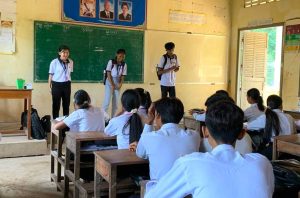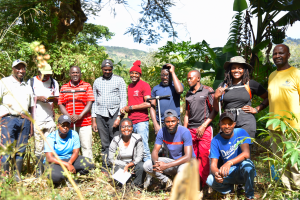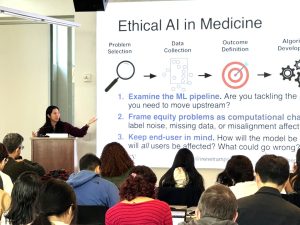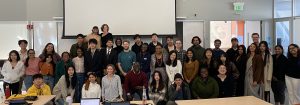What do US Supreme Court Justice Stephen Breyer, Nobel Laureate and Former US Vice President Al Gore, His Holiness the Dalai Lama and Former President of Ireland Mary Robinson have in common?
They all are part of a month-long celebration at the University of California, Berkeley to commemorate the third anniversary of the launch of the Richard C. Blum Center for Developing Economies. 
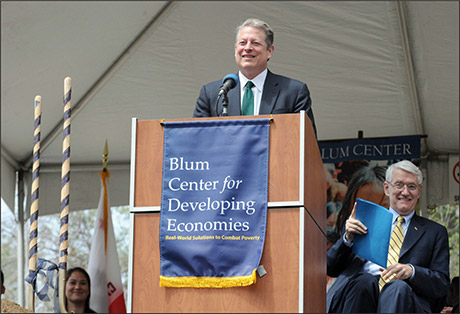
The Blum Center is a spectacularly successful multidisciplinary research and education center devoted to delivering real world solutions to combat poverty. Founded three years ago by San Francisco financier and philanthropist Richard C. Blum, the Center has exceeded even the most optimistic predictions.
“Of all the investments I’ve made in my life, what we’re doing here certainly ranks near the top,” said Richard Blum. “Our real impact is in training the next generation of global leaders committed to making lasting change for the poor.”
Over 1500 students have participated in the Center’s classes, symposium and events. A key element of the Center’s outreach to students is its unique undergraduate academic minor in Global Poverty & Practice, which gives students the knowledge and real-world experience needed to become dynamic participants in the fight against global poverty. In only three years, the Center has become a veritable magnet for a “Yes We Can” generation, eager to make a difference both in their local community and in communities across the world. More than 210 students are already enrolled in the minor, a level not anticipated until 2015, making it the fastest growing minor on campus. These students come from more than 30 different majors including Engineering, Architecture, Business and Biology. In addition to a continuously evolving portfolio of coursework and educational programs designed to educate students about global poverty, students participate directly in poverty alleviation efforts in more than twenty five developing countries.
“The faculty and students at the Blum Center can change the world,” said Nobel Prize winner and Former Vice President Al Gore said. “Their efforts can have a truly significant impact on global poverty for years to come.”
“I am extremely proud of the exceptional work being done at the Blum Center,” stated UC Berkeley Chancellor Robert Birgeneau. “This initiative came together at the perfect moment to speak deeply to a major concern of our students and faculty.”
Interest and enthusiasm for the Blum Center is tremendous – and thus the growth of the Center
over the last three years necessitated the creation of
a home. Richard Blum generously offered to finance the restoration of the Naval Architecture Building and the construction of a new wing to provide that home. The project is being developed by a private, non-profit organization created and funded by Richard Blum. Construction is expected to begin later this year, with project completion expected to take 16 months.
“What the Blum Center has already accomplished in just three years is nothing short of amazing,” noted George Shultz, former US Secretary of State and now a Trustee of the Blum Center.
In addition to educating the next generation of global citizens, the Center currently supports sixteen innovation initiatives involving faculty and students from more than thirty departments. These projects are expanding access to safe water and sanitation, adapting wireless technologies to increase access to lifesaving health care services and deploying new efficient energy technologies that minimize harmful environmental impacts. After successful piloting, the Center helps to transition the projects to outside partners so that the innovations will have a real and lasting impact on urgent global problems.
The person behind all this is Richard Blum. For more than thirty years, he has been devoted to alleviating global poverty by supporting practical and engaged efforts that deliver real results. Focused primarily on global poverty and education, he is Founder and Chairman of the American Himalayan Foundation (AHF), which was established 25 years ago. AHF has 170 projects providing vital healthcare, education, and environmental and cultural preservation throughout the Himalayan region. Four years ago, Mr. Blum founded the Global Economy and Development Center at The Brookings Institution and the Brookings Blum Roundtable Conference, to develop policy research and new strategies to alleviate poverty. He is also a trustee and a member of the executive committee of The Carter Center, founded by former President Jimmy Carter, and serves on the boards of William J. Clinton Foundation and The Wilderness Society.
“Dick Blum shares my belief that we all need to make a lifelong commitment to poverty alleviation, one of the challenges my Foundation tackles in Africa and Latin America as well as through the work of students who attend the
Clinton Global Initiative University,” President Bill Clinton said. “I’m pleased to see the Blum Center grow into a space where even more young people can turn their ideas and energy into action and results that benefit the common good.”
“The Richard C. Blum Center for Developing Economies’ commitment to combat global poverty has great potential to bring about far reaching change,” stated President Jimmy Carter, an Honorary Trustee of the Blum Center. “A new generation of global leaders dedicated to making positive change and the innovative economic development of the poorest nations inevitably will contribute to the alleviation of suffering and the creation of a more peaceful world. These ideals can and must be pursued by this and coming generations.”
Earlier this month, the Blum Center was delighted to welcome Supreme Court Justice Stephen Breyer to speak about the rule of law in developing economies. On April 25th, the Blum Center is proud to join The American Himalayan Foundation in sponsoring an address by His Holiness the Dalai Lama entitled “Peace through Compassion.” A lecture about global health and human rights by Mary Robinson, former President of Ireland, will round out the month on April 29th.

